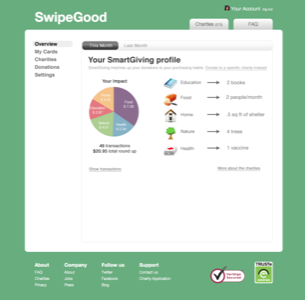The charitable giving service SwipeGood is launching a new feature today called “SmartGiving” that will enable its users to donate to different charities based on their monthly spending patterns.

SwipeGood’s goal, according to co-founder Steli Efti, is to build a “simple, elegant solution to giving.” By tying donations in to your regular spending habits, SwipeGood has certainly made it simple. The company rounds up to the nearest dollar on every credit card transaction you make, and then donates that lump sum to a charitable organization. That works out to a roughly $20 donation per person who’s joined the platform so far – spare change adds up.
Since SwipeGood launched late last year, Efti says they’ve attracted different sorts of users. Some have a clear idea of which cause they’d like their donations to go toward. Others like the idea of giving back, but aren’t particularly passionate about one cause or another. These users often bail from the system, overwhelmed by the 300 plus charities to choose from and unsure about where best to target their donations.
A new feature launching today with SwipeGood addresses that. “SmartGiving” allocates the donations based on users’ actual spending habits. Rather than selecting one charity, SmartGiving means that donations are directed to multiple charities. Based on how your spending is allocated – groceries, housing, travel, for example – SmartGiving will automatically direct funds to food-, housing-, and eco-related charities.

The idea of simplifying charitable donations is a nice one, and on one hand I think people might be willing to turn over their “spare change” for this sort of endeavor. On the other, I’m not sure if people will balk at having their spending data analyzed for this sort of thing. Users’ financial data is kept private here – this isn’t quite a Blippy for charitable giving. Using the category data from card transactions, SwipeGood breaks down spending into 5 large categories – home, food, healthcare, education, and nature. Watching that allocation and how it plays out as a charitable contribution might prove interesting data for some folks to consider their lifestyle and purchase habits.






